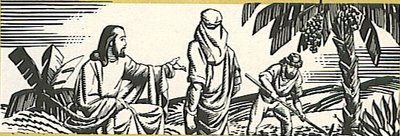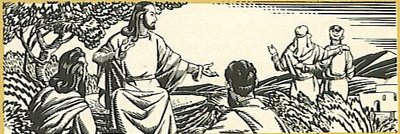Signs of the Times

Chapter 67
LUKE 12:54—13:9
Having exhorted His disciples on the need to be watchful and prepared for death, Jesus now turned to the people and addressed them on the same theme:
"When you see a cloud rising in the west, you say at once, 'A shower is coming,' and so it comes to pass. And when you see the south wind blow, you say, 'There will be a scorching heat,' and so it comes to pass. You hypocrites! you know how to judge the face of the sky and of the earth; but how is it that you do not judge this time? But why even of yourselves do you not judge what is right?
"And when thou art going with thy opponent to the ruler, take pains to be quit of him on the way, lest he deliver thee to the judge, and the judge to the officer, and the officer cast thee into prison. I say to thee, thou wilt not come out from it until thou hast paid the very last mite."
At this point someone brought word of some Galileans who had been massacred by Pilate in the temple. Jesus said:
"Do you think that these Galileans were worse sinners than all the other Galileans, because they have suffered such things? I tell you, no; but unless you repent, you will all perish in the same manner. Or those eighteen upon whom the tower of Siloe fell and killed them; do you think that they were more guilty than all the other dwellers in Jerusalem? I tell you, no; but unless you repent, you will all perish in the same manner."
Then He told them this parable:
"A certain man had a fig tree planted in his vineyard; and he came seeking fruit thereon, and found none. And he said to the vine-dresser, 'Behold, for three years now I have come seeking fruit on this fig tree, and I find none. Cut it down, therefore; why does it still encumber the ground?' But he answered and said to him, 'Sir, let it alone this year too, till I dig around it and manure it. Perhaps it may bear fruit; but if not, then afterwards thou shalt cut it down.' "
 We also know how to read the face of the sky and the earth; but we often fail to read the signs of our times. The conflicts and catastrophes of our day should lead us to pray and to sacrifice. At Fatima Mary appeared and called for prayer and penance. In my personal life is there more prayer and more penance because the times demand it? Or do I ignore the signs of the times?
We also know how to read the face of the sky and the earth; but we often fail to read the signs of our times. The conflicts and catastrophes of our day should lead us to pray and to sacrifice. At Fatima Mary appeared and called for prayer and penance. In my personal life is there more prayer and more penance because the times demand it? Or do I ignore the signs of the times?
LUKE 12:54—13:9
Having exhorted His disciples on the need to be watchful and prepared for death, Jesus now turned to the people and addressed them on the same theme:
"When you see a cloud rising in the west, you say at once, 'A shower is coming,' and so it comes to pass. And when you see the south wind blow, you say, 'There will be a scorching heat,' and so it comes to pass. You hypocrites! you know how to judge the face of the sky and of the earth; but how is it that you do not judge this time? But why even of yourselves do you not judge what is right?
"And when thou art going with thy opponent to the ruler, take pains to be quit of him on the way, lest he deliver thee to the judge, and the judge to the officer, and the officer cast thee into prison. I say to thee, thou wilt not come out from it until thou hast paid the very last mite."
At this point someone brought word of some Galileans who had been massacred by Pilate in the temple. Jesus said:
"Do you think that these Galileans were worse sinners than all the other Galileans, because they have suffered such things? I tell you, no; but unless you repent, you will all perish in the same manner. Or those eighteen upon whom the tower of Siloe fell and killed them; do you think that they were more guilty than all the other dwellers in Jerusalem? I tell you, no; but unless you repent, you will all perish in the same manner."
Then He told them this parable:
"A certain man had a fig tree planted in his vineyard; and he came seeking fruit thereon, and found none. And he said to the vine-dresser, 'Behold, for three years now I have come seeking fruit on this fig tree, and I find none. Cut it down, therefore; why does it still encumber the ground?' But he answered and said to him, 'Sir, let it alone this year too, till I dig around it and manure it. Perhaps it may bear fruit; but if not, then afterwards thou shalt cut it down.' "
 We also know how to read the face of the sky and the earth; but we often fail to read the signs of our times. The conflicts and catastrophes of our day should lead us to pray and to sacrifice. At Fatima Mary appeared and called for prayer and penance. In my personal life is there more prayer and more penance because the times demand it? Or do I ignore the signs of the times?
We also know how to read the face of the sky and the earth; but we often fail to read the signs of our times. The conflicts and catastrophes of our day should lead us to pray and to sacrifice. At Fatima Mary appeared and called for prayer and penance. In my personal life is there more prayer and more penance because the times demand it? Or do I ignore the signs of the times?


